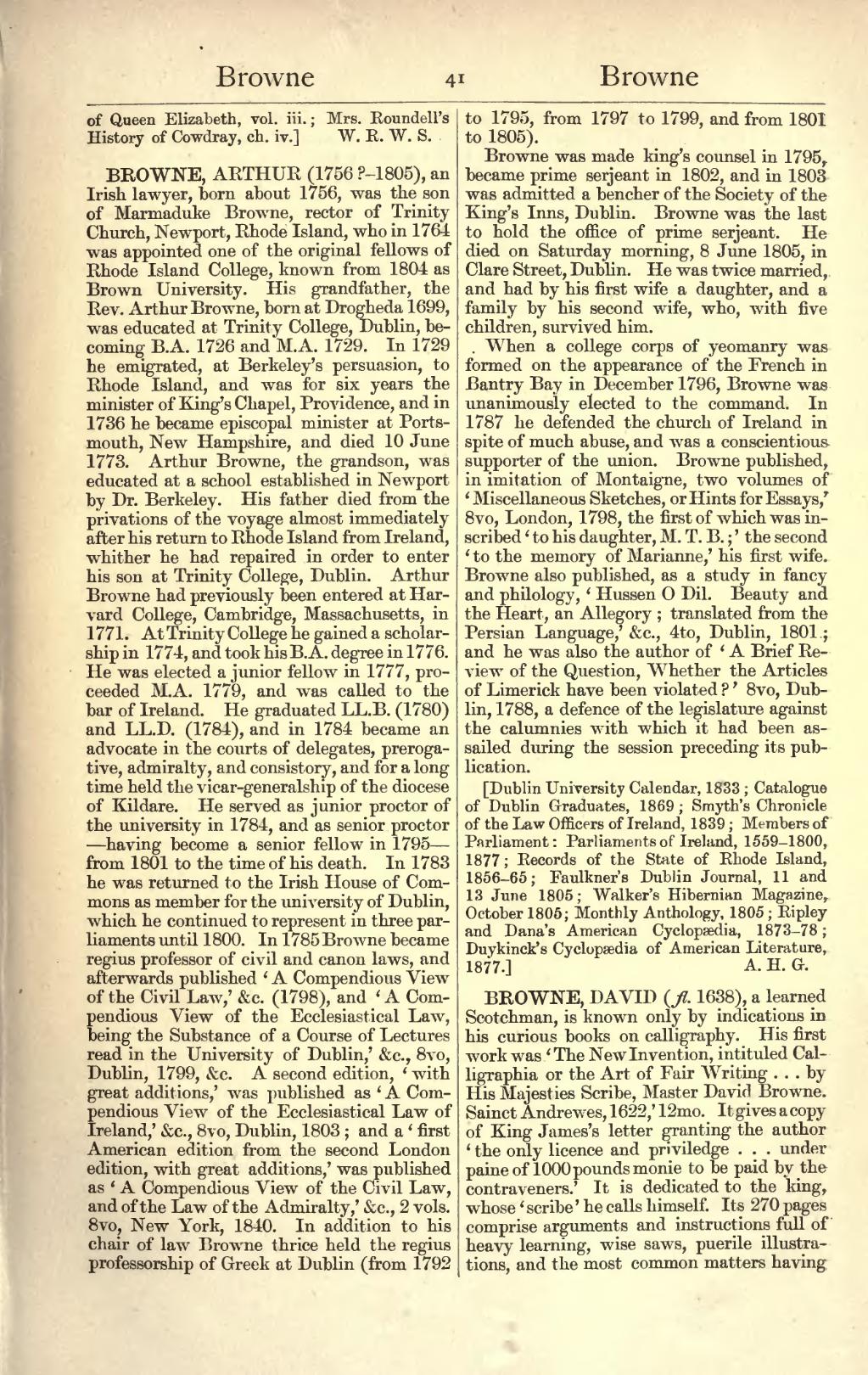BROWNE, ARTHUR (1756?–1805), an Irish lawyer, born about 1756, was the son of Marmaduke Browne, rector of Trinity Church, Newport, Rhode Island, who in 1761 was appointed one of the original fellows of Rhode Island College, known from 1804 as Brown University. His grandfather, the Rev. Arthur Browne, born at Drogheda 1699, was educated at Trinity College, Dublin, becoming B.A. 1726 and M.A. 1729. In 1729 he emigrated, at Berkeley’s persuasion, to Rhode Island, and was for six years the minister of Kings Chapel, Providence, and in 1736 he became episcopal minister at Portsmouth, New Hampshire, and died 10 June 1773. Arthur Browne, the grandson, was educated at a school established in Newport by Dr. Berkeley. His father died from the privations of the voyage almost immediately after his return to Rhode Island from Ireland, whither he had repaired in order to enter his son at Trinity College, Dublin. Arthur Browne had previously been entered at Harvard College, Cambridge, Massachusetts, in 1771. At Trinity College he gained a scholarship in 1774, and took his B.A. degree in 1776. He was elected a junior fellow in 1777, proceeded M.A. 1779, and was called to the bar of Ireland. He graduated LL.B. (1780) and LL.D. (1784), and in 1784 became an advocate in the courts of delegates, prerogative, admiralty, and consistory, and for a long time held the vicar-generalship of the diocese of Kildare. He served as junior proctor of the university in 1784, and as senior proctor—having become a senior fellow in 1795—from 1807 to the time of his death. In 1783 he was returned to the Irish House of Commons as member for the university of Dublin, which he continued to represent in three parliaments until 1800. In 1785 Browne became regius professor of civil and canon laws, and afterwards published ‘A Compendious View of the Civil Law,' &c. (1798), and ‘A Compendious View of the Ecclesiastical Law, being the Substance of a Course of Lectures read in the University of Dublin,’ &c., 8vo, Dublin, 1799, &c. A second edition, ‘with great additions,’ was published as ‘A Compendious View of the Ecclesiastical Law of Ireland,' &c., 8vo, Dublin, 1803; and a ‘first American edition from the second London edition, with great additions,' was published as ‘A Compendious View of the Civil Law, and of the Law of the Admiralty,' &c., 2 vols. 8vo, New York, 1840. In addition to his chair of law Browne thrice held the regius professorship of Greek at Dublin (from 1792 to 1795, from 1797 to 1799, and from 1801 to 1805).
Browne was made king's counsel in 1795, became prime serjeant in 1802, and in 1803 was admitted a bencher of the Society of the Kings Inns, Dublin. Browne was the last to hold the office of prime serjeant. He died on Saturday morning, 8 June 1805, in Clare Street, Dublin. He was twice married, and had by his first wife a daughter, and a family by his second wife, who, with five children, survived him.
When a college corps of yeomanry was formed on the appearance of the French in Bantry Bay in December 1796, Browne was unanimously elected to the command. In 1787 he defended the church of Ireland in spite of much abuse, and was a conscientious supporter of the union. Browne published, in imitation of Montaigne, two volumes of ‘Miscellaneous Sketches, or Hints for Essays,' 8vo, London, 1798, the first of which was inscribed ‘to his daughter, M. T. B.,’ the second ‘to the memory of Marianne,’ his first wife. Browne also published, as a study in fancy and philology, ‘Hussen O Dil. Beauty and the Heart, an Allegory; translated from the Persian Language,’ &c., 4to, Dublin, 1801, and he was also the author of ‘A Brief Review of the Question, Whether the Articles of Limerick have been violated?' 8vo, Dublin, 1788, a defence of the legislature against the calumnies with which it had been assailed during the session preceding its publication.
[Dublin University Calendar, 1833; Catalogue of Dublin Graduates, 1869; Smyth's Chronicle of the Law Officers of Ireland, 1839; Members of Parliament: Parliaments of Ireland, 1559–1800, 1877; Records of the State of Rhode Island, 1856–65; Faulkner's Dublin Journal, 11 and 13 June 1805; Walker’s Hibernian Magazine, October 1805; Monthly Anthology, 1805; Ripley and Dana's American Cyclopædia, 1873–78; Duykinck's Cyclopædia of American Literature, 1877.]
BROWNE, DAVID (fl. 1638), a learned Scotchman, is known only by inclinations in his curious books on calligraphy. His first work was ‘The New Invention, intituled Calligraphia or the Art of Fair Writing . . . by His Majesties Scribe, Master David Browne. Sainct Andrewes, 1622,’ 12mo. It gives a copy of King James’s letter granting the author ‘the only licence and priviledge . . . under paine of 1000 pounds monie to be paid by the contraveners.’ It is dedicated to the king, whose ‘scribe’ he calls himself. Its 270 pages comprise arguments and instructions full of heavy learning, wise saws, puerile illustrations, and the most common matters having
